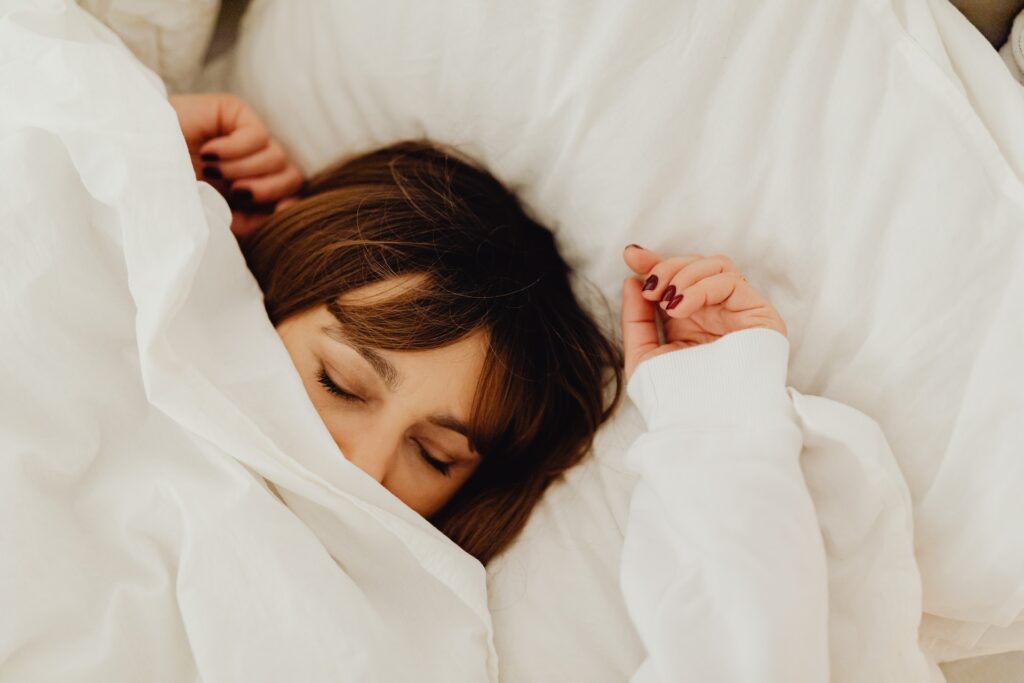If you struggle with Insomnia, these natural remedies can help improve your sleep quality. From establishing a regular sleep routine to trying relaxation techniques and natural sleep aids, these tips can help you beat insomnia.
Insomnia, a sleep disorder that makes it difficult to fall asleep or stay asleep, is a common problem that affects millions of people worldwide. While there are prescription medications available to help manage insomnia, they can have side effects and be addictive. In this blog post, we will explore the causes of insomnia and provide tips and natural remedies to help overcome it.

Causes of Insomnia
Insomnia can be caused by a variety of factors, including stress, anxiety, depression, chronic pain, certain medications, and poor sleep habits. Identifying and addressing the underlying cause of insomnia is essential for long-term relief. However, natural remedies can also help improve sleep quality.
Tips and Natural Remedies for Overcoming Insomnia:
Establish a Regular Sleep Routine
Going to bed and waking up at the same time every day can help regulate your body’s internal clock and improve sleep quality. It is also important to maintain a consistent sleep schedule even on weekends and holidays.
How to Establish it?
Establishing a regular sleep routine is an important step toward improving your sleep quality and overcoming insomnia. Here are some tips to help you establish a regular sleep routine:
- Set a consistent bedtime and wake-up time: Try to go to bed and wake up at the same time every day, including on weekends and holidays. This will help regulate your body’s internal clock and improve your sleep quality.
- Wind down before bed: Develop a relaxing bedtime routine to help your body and mind unwind before sleep. This may include taking a warm bath, reading a book, or practicing relaxation techniques like deep breathing or meditation.
- Avoid stimulating activities before bed: Avoid activities that can interfere with your sleep, such as using electronic devices or engaging in stimulating activities like watching a thrilling movie.
- Create a sleep-conducive environment: Make sure your bedroom is cool, quiet, and dark. Use comfortable bedding and pillows to create a comfortable sleeping environment.
- Limit caffeine and alcohol consumption: Caffeine and alcohol can interfere with your sleep, so it’s important to limit your consumption, especially in the evening.
- Avoid naps: While napping can be refreshing, it can also interfere with your sleep at night. If you must nap, limit it to no more than 20-30 minutes, and avoid napping too close to bedtime.

By following these tips and establishing a regular sleep routine, you can improve your sleep quality and overcome insomnia. Remember, it may take a few weeks for your body to adjust to a new sleep routine, so be patient and persistent.
Create a Relaxing Sleep Environment
A cool, quiet, and dark bedroom can help promote sleep. Noise machines, earplugs, and eye masks can help block out unwanted noise and light. Avoid using electronic devices before bed, as the blue light can disrupt your sleep-wake cycle.
How to Create a Relaxing Sleep Environment?
Creating a relaxing sleep environment can help you fall asleep faster and improve your sleep quality. Here are some tips to help you create a relaxing sleep environment:
- Keep your bedroom cool and quiet: The ideal bedroom temperature for sleeping is between 60 and 67 degrees Fahrenheit (15.5 and 19.5 degrees Celsius), so adjust your thermostat accordingly. Use earplugs or a white noise machine to block out any noise that might disturb your sleep.
- Use comfortable bedding: Choose a comfortable mattress and pillows that support your sleeping position. Use soft and breathable bed sheets that keep you cool and comfortable.
- Control the lighting: Use blackout curtains or blinds to keep your bedroom dark, especially if you live in an area with streetlights or other sources of light. Consider using a sleep mask if you need complete darkness.
- Minimize clutter: A cluttered bedroom can make it difficult to relax and sleep. Keep your bedroom clean and tidy, and avoid using it as a workspace or storage area.
- Eliminate distractions: Remove any electronic devices that may interfere with your sleep, such as TVs, computers, and smartphones. If you need to use your phone as an alarm clock, turn off all notifications and put it in Do Not Disturb mode.
- Use aromatherapy: Some essential oils, such as lavender, chamomile, and bergamot, have relaxing properties that can promote sleep. Use a diffuser or a pillow spray to add a few drops of your favorite essential oil to the air.
By following these tips, you can create a relaxing sleep environment that promotes restful sleep and helps you wake up feeling refreshed.
Practice Relaxation Techniques
Meditation, deep breathing, and yoga can help calm the mind and body and promote better sleep. A relaxing bedtime routine, such as taking a warm bath or reading a book, can also help you wind down and prepare for sleep.
How to Practice Relaxation Techniques
Practicing relaxation techniques can help you reduce stress and anxiety, which can contribute to insomnia. Here are some relaxation techniques that you can try:
- Deep breathing: Take slow, deep breaths in through your nose and out through your mouth. Focus on the sensation of the breath moving in and out of your body.
- Progressive muscle relaxation: Tense and relax different muscle groups in your body, starting with your feet and working your way up to your head. Hold the tension for a few seconds before releasing.
- Visualization: Imagine a peaceful scene, such as a beach or a forest. Visualize yourself in this scene, using all of your senses to make it as vivid as possible.
- Mindfulness meditation: Sit in a comfortable position and focus on your breath. When your mind wanders, gently bring it back to your breath without judgment.
- Yoga: Practice gentle yoga poses, such as child’s pose or downward dog, to help release tension in your body and calm your mind.
- Massage: Give yourself a gentle massage, or ask a partner or friend to give you one. Massage can help release tension in your muscles and promote relaxation.
Try incorporating these relaxation techniques into your daily routine, especially before bed. You can also combine them with other sleep-promoting practices, such as creating a relaxing sleep environment and establishing a regular sleep routine, to improve your sleep quality and overcome insomnia.
Exercise Regularly
Regular exercise can help reduce stress and anxiety, which can contribute to insomnia. However, avoid vigorous exercise close to bedtime, as it can be too stimulating and interfere with sleep.
Avoid Caffeine, Alcohol, and Nicotine
Caffeine, alcohol, and nicotine can interfere with sleep and should be avoided or limited, especially in the evening. Caffeine can stay in your system for several hours, so it is best to avoid it after lunch.
Try Natural Sleep Aids
There are several natural aids that can be used to help manage insomnia. Here are some options:
- Melatonin supplements: Melatonin is a hormone that helps regulate the sleep-wake cycle. Taking a melatonin supplement 30 minutes to an hour before bed may help you fall asleep faster and improve your sleep quality.
- Valerian root: Valerian root is a natural sedative that can promote relaxation and reduce anxiety. It can be taken in supplement form or as a tea.
- Chamomile tea: Chamomile tea has a calming effect that can help promote relaxation and improve sleep quality.
- Lavender: Lavender is known for its calming and relaxing properties. You can use lavender essential oil in a diffuser, as a pillow spray, or in a bath to help promote relaxation and improve sleep quality.
- Magnesium: Magnesium is a mineral that can help promote relaxation and reduce stress. Taking a magnesium supplement or eating foods rich in magnesium, such as almonds, spinach, and avocado, may help improve sleep quality.
- Exercise: Regular exercise can help reduce stress and anxiety, which can contribute to insomnia. Aim for at least 30 minutes of moderate exercise per day, but avoid exercising too close to bedtime.
It’s important to talk to your healthcare provider before starting any new supplements or making significant changes to your diet or exercise routine. They can help you determine the best natural aids to use for your specific situation.
Therapies that can help with Insomnia
- Cognitive Behavioral Therapy (CBT): CBT is a type of talk therapy that can help you identify and change negative thoughts and behaviors that may be contributing to your insomnia. It can be an effective treatment for insomnia, especially when combined with other sleep-promoting practices.
- Acupuncture: Acupuncture is a type of Traditional Chinese Medicine that involves the insertion of thin needles into specific points on the body. It has been shown to help improve sleep quality and reduce symptoms of insomnia.
- Sleep restriction therapy: This involves restricting the amount of time you spend in bed to match the amount of time you actually sleep. Over time, this can help improve sleep quality and reduce insomnia.
Conclusion: Insomnia can be a frustrating and disruptive sleep disorder, but there are many natural remedies available to help improve sleep quality. By establishing a regular sleep routine, creating a relaxing sleep environment, practicing relaxation techniques, exercising regularly, and avoiding substances that can interfere with sleep, you can take control of your sleep and overcome insomnia naturally. However, if your insomnia persists, talk to your doctor to rule out any underlying medical conditions and discuss further treatment options.



[…] How to Improve Sleep Quality Naturally: Tips for Beating Insomnia […]